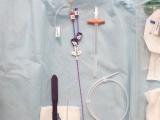The US Preventive Services Task Force (USPSTF) yesterday recommended that only pregnant women should be screened for asymptomatic bacteriuria (ASB), based on findings of a moderate net benefit in reducing perinatal complications.
The findings appear in an evidence report, published yesterday in JAMA, that found that screening and treatment for ASB—the presence of bacteria in the urine in the absence of signs or symptoms of a urinary tract infection—in pregnant women during the first prenatal visit was associated with reduced rates of pyelonephritis and low birth weights. But the grade for the USPSTF recommendation was lowered from A (high certainty of a net benefit) to B (moderate certainty).
"The USPSTF changed the grade for pregnant persons from an 'A' to a 'B' based on the reduced applicability of the previous evidence that included outdated antibiotic treatment regimens and newer evidence that shows a significantly lower risk of pyelonephritis than found in previous reviews," the task force says in its recommendation statement. "In addition, there are newer concerns about antibiotic use, such as antimicrobial resistance and adverse changes to the microbiome (not addressed in current studies), leading to an increase in the magnitude of potential harms."
The Task Force continues to recommend against screening for ASB in nonpregnant women or healthy men, noting that there is a moderate or high certainty the service has no net benefit (D grade).
The USPSTF is an independent panel of national experts in prevention and evidence-based medicine that makes recommendation on screenings, counseling services, and preventive medications. Its recommendations on ASB screening, which apply to adults and pregnant women of any age without signs or symptoms of a urinary tract infection, were last updated in 2008.
Culture of routine urine testing
In an editorial published in JAMA Network Open, Kalpana Gupta, MD, of the Veterans Affairs Boston Healthcare System, and Barbara Trautner, MD, of the Michael E. DeBakey Veterans Affairs Medical Center in Houston, say the recommendation against screening for ASB in nonpregnant adults is a "powerful buttress" for antibiotic stewardship programs that are seeking to reduce the practice, which is a frequent source of unnecessary antibiotic prescribing.
"Overdiagnosis of urinary tract infection in patients who instead have ASB is a major contributor to antibiotic overuse in outpatient clinics, hospitals, long-term care facilities, and emergency departments," they write.
But in another editorial, published in JAMA Internal Medicine, Jerome Leis, MD, and Christine Soong, MD, of the University of Toronto, suggest that the recommendation might not be enough. They write that while the recommendation against screening or treating ASB in nonpregnant adults has long been endorsed by the Infectious Diseases Society of America and other professional medical societies, "it remains stubbornly disregarded by clinicians across multiple settings."
The reason, they explain, is not lack of knowledge. Rather, it's the result of over-ordering urine cultures and using urinary tract infections as a scapegoat for many non-specific clinical presentations, such as delirium or febrile illness.
"While the United States Preventive Services Task Force recommendations represent a starting point, focusing solely on guidelines to address potential knowledge gaps detracts from the real problem: socioadaptive factors perpetuate the nonevidenced practice of collecting urine cultures and treating asymptomatic bacteriuria among nonpregnant adults," Leis and Soong write.
Both editorials agree that, for the recommendation to have a real impact on clinical practice, the medical community needs to move away from the culture of routine urine testing.
See also:
Sep 24 USPSTF ASB screening recommendation
Sept 24 JAMA USPSTF evidence report
Sep 24 JAMA Netw Open editorial
Sep 24 JAMA Intern Med editorial
























